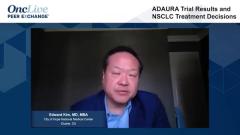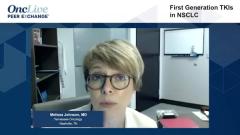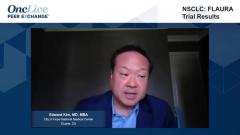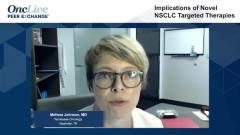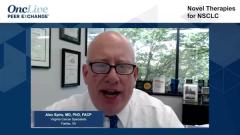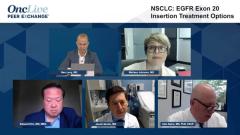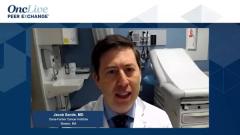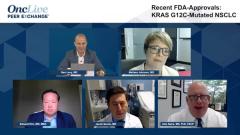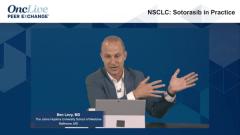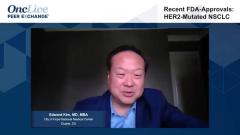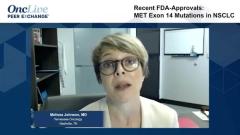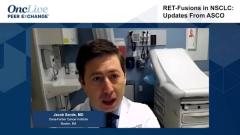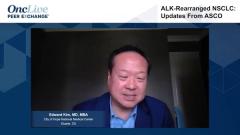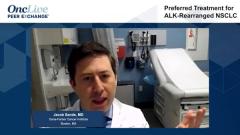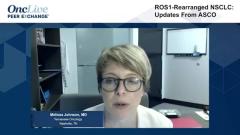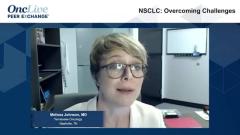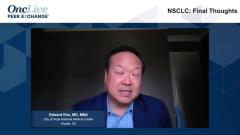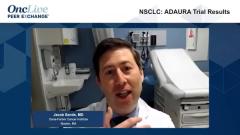
NSCLC: Overcoming Challenges
Oncology experts provide insight on screening methods available and discuss strategies that may address challenges in identification of targetable mutations/tumor profiles in non–small cell lung cancer (NSCLC).
Episodes in this series

Benjamin Levy, MD:Wedding these genotypes to targeted therapies, we’re improving the outcome of our patients, but we saw some interesting data at ASCO [American Society of Clinical Oncology annual meeting] showing how woefully under-genotyped patients are. Retrospective analysis from a large group of community oncologists showed that over, I believe 2500 to 3000 patients with non–small cell lung cancer, in which if you’re looking at trying to identify ALK, BRAF, EGFR, ROS, and PD-L1, those are the 5 targets, only roughly 50% of patients have all of those targets tested for. This is not surprising to me. I think we need to do better, and my question to the panel is how do we do better and what are the strategies to do better? We’ve gone over in the last 90 minutes all these great drugs, but you can’t give the right drug unless you know the right mutation. There’s a lot of head nodding here. I’d love to hear people’s feedback on how we overcome these barriers. Alex?
Alex Spira, MD, PhD, FACP: I’m going to start with this one because that was my group, and I’m on that abstract. I sat there going, “Do you really want to publish these data?” The whole thing about this was to get these data out there, and there are going to be interventional studies, which is the second point. But I said, “You’re going to put this thing out there?” And they were putting it as, “Look what we’ve done,” and I’m saying, “Look how bad you’re doing.” I got equally as many texts from people saying, “You guys should be really embarrassed,” as I got saying, “Thanks for getting this out there.” I’ll leave it at that.
Melissa Johnson, MD: Hold on a minute though. Alex, I’ll defend you if you won’t defend you. First of all, it was a data set that ended in 2019, and here we are in 2021. All of the drugs we’ve talked about today have been FDA approved during that time. I would say there is some historical bias here, but the other thing that presentation and the one that followed it screamed to me is: the barriers we have in terms of processes for getting this testing done. It’s not that the oncologists, at least within my practice, don’t know what to do and don’t know what to do with the results as much anymore. It’s that every hospital system has a different answer for triage of tissue and shepherding of tissue. It’s that some require a hotspot panel for cost before you can get an NGS [next-generation sequencing] test, let alone an RNA-seq [sequencing] assay. It’s that there are a lot of pathology and pulmonary groups that are still trying to make their bottom line and are not being given the tools from a payer perspective to do that.
That was the piece I wanted to come out in that discussion because I hit my head up against that every day of the week here. I will say that we also had that discussion after Tennessee Oncology’s lung wrap-up Friday afternoon after the metastatic lung session. We looked at our data this weekend to see what our results were, and ours were in the 90% range, but we did a contemporary look. And I bet, Alex, if US Oncology [Network] did the same in 2021, the numbers would rise.
Alex Spira, MD, PhD, FACP: Thanks for your defense, Melissa. I’ve seen all the data, we’ve done this. The data are a little bit better, but not where they should be, and it’s where the dichotomy is. Ed, and Jacob, and Ben, you guys are in institutions with one place that you can do it and you can change things. If you look at my numbers, our numbers are a lot better. Obviously, our group does a significantly better job, but there’s a huge challenge. You’re right, Melissa, it’s all about community, it’s all about pathologists, it’s all about multiple hospital systems, and people don’t see these. The hope with this project is not to embarrass ourselves, the hope is to see what we can do, can you get your hospitals, can you get your systems to do a better job? I hope that’s what this brings, and that’s the whole intent of this project. It is not that easy to do, so thanks for the defense, Melissa.
Benjamin Levy, MD:Yes. I can feel the passion coming through the Zoom, and I love it. It’s very exciting. My statement about molecular testing is it takes a village, and it is hard to execute and complete.
TRANSCRIPT EDITED FOR CLARITY


